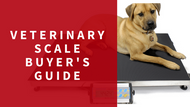Veterinary Scale Buyer's Guide
Posted by Jon M on May 5th 2018
Veterinarians, zoologists and animal lovers alike work hard to keep their beloved animals healthy. Maintaining a healthy diet, sufficient exercise and an appropriate weight are important for ensuring pets live long and healthy lives. To monitor weight, veterinary scales are designed specifically for the task of animal weighing. There are a lot of options out there, so we've put together this handy buying guide to help you find the best solution.
Animal Weighing Function
Although most vet scales include this feature by default, look for models that include an animal weighing mode, or dynamic weighing mode.To keep it simple, dynamic weighing takes into account movement of the animal and can determine a final result even without a constant stable reading. Often times, animals may become excited and move while being weighed. This could throw the measurement off. Animal weighing modes help to filter out that movement and determine the weight rather accurately. When shopping for a scale, look to see if they include animal or dynamic weighing modes.
Animal Weight
Big, small and all sizes in between, you'll want to determine the weight of all the animals you care for. Determine the weight of the smallest animal and the weight of the largest. This will give you a good range to determine the overall capacity of your veterinary scale.
For example, if you only weigh dogs weighing between 60-80 pounds, it would be advisable to buy a vet scale with a capacity of 100 pounds or more. I suggest going a bit above the max capacity to prepare for the possibility of a need for increased weight down the road. Who knows. You might end up needing to weigh a much bigger pooch!
Platform Size
As is true with the overall capacity, you'll need to get a scale that will accommodate the size of the animals you're weighing. You wouldn't want to have Fido balancing on a single paw, right?! Veterinary scales come in a wide range of sizes.
For measuring smaller animals like rabbits, rodents or reptiles, you can buy smaller bench top scales. Some of them come with a handy cradle to keep your pet comfortable and from taking a spill. Although designed for toddler weighing, the Adam Equipment MTB 20 is a great option for weighing small animals on a budget.
Larger animals like dogs, some cats or penguins (yes, we've had this request before!), require a larger platform. You might consider a Tree LVS 700 XL veterinary scale as it provides a large weighing surface measuring 44 by 22 inches. Plenty of space!
And let's not forget about the largest of our animal friends. For weighing animals like cows, pigs, horses or other farm animals, it's necessary to bring out the big tools. Pallet beam scales, cattle scales and floor scales can accommodate heavier loads and some are specifically designed for animal weighing. These beam type scales are versatile, often times portable and can accommodate a wide range of bigger farm animals.
Price
It is important to find a veterinary scale that fits the best for your animals. However, it's not necessary to overspend on robust models when basic weighing is needed. If you're weighing your beloved pet at home, consider more cost effective models that strip out all the fancy weighing modes, communication options and add-ons. You can find a variety of low price veterinary scales at Scales Plus (shameless plug)!
Veterinary clinics, zoos and animal rescue shelters should consider quality over cost. Consider the wide-range of animals you'll be working with, the consistent use and the necessity to be as accurate as possible. Spend more when possible and purchase models that offer durability, stainless steel components for easy cleaning and communication options to export and save weighing data. Data is particularly important in animal hospitals and vet clinics.

Do you need help finding a scale for your animals? Have something to add? Contact us today!





